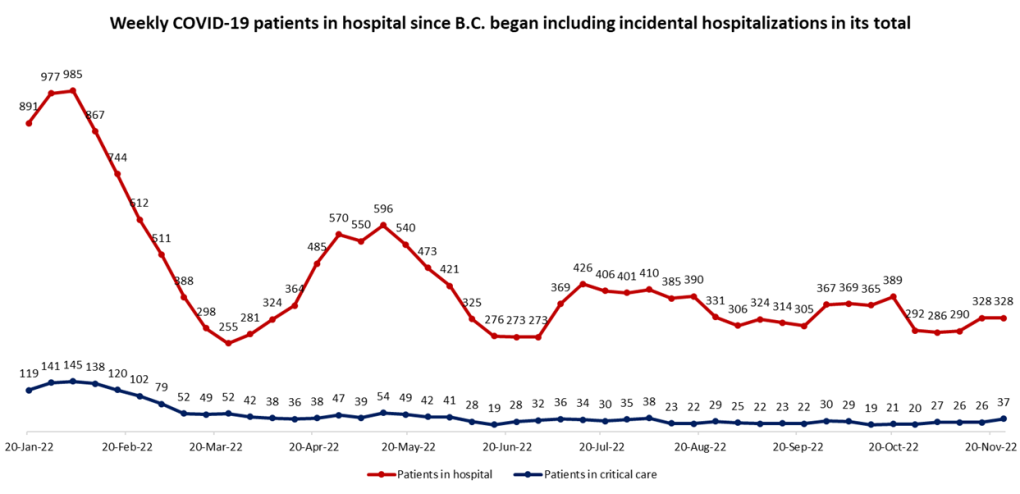More patients in critical care with COVID-19 in B.C.'s latest update
 Courtesy: Shutterstock.
Courtesy: Shutterstock.
British Columbia hospitals are treating the same number of COVID-19-positive patients this week as they were last week, according to the latest update from the B.C. Centre for Disease Control.
The number of patients in critical care, however, has risen to its highest level since early August. There were 37 test-positive COVID-19 patients in critical care in B.C. Thursday, up from 26 last week. The overall number of patients stayed level at 328.
 This graph shows the number of people in hospital and critical care with COVID-19 in B.C. on Thursdays since the province switched to a "hospital census" model in January. (CTV)
This graph shows the number of people in hospital and critical care with COVID-19 in B.C. on Thursdays since the province switched to a "hospital census" model in January. (CTV)
Current hospitalizations in B.C. reflect what the province calls a "hospital census" model. This means the reported numbers include both those with severe cases of COVID-19 requiring hospitalization and those who are admitted to hospital for other reasons and test positive incidentally.
Since the BCCDC began counting hospitalizations this way in January, there have been as many as 985 and as few as 255 patients in B.C. hospitals on Thursdays.
PEDIATRIC RESPIRATORY ILLNESS
B.C. hospitals are currently struggling to deal with a surge in respiratory illness among children, with doctors at Surrey Memorial Hospital reporting quadruple the number of patients for which their emergency department was designed.
This week, BC Children's Hospital activated an overflow unit for its emergency department.
Last week, provincial health officer Dr. Bonnie Henry said COVID-19 is "not what's causing most of the respiratory illness that we're seeing right now," pointing the finger instead at influenza, common cold viruses and RSV.
According to BCCDC data, symptoms of respiratory illness accounted for 6.3 per cent of all doctor visits billed to the province's Medical Services Plan during the week of Nov. 13 to 19, continuing a sharp increase in recent weeks.
Visits for suspected COVID-19 have declined during that time, however, accounting for less than one per cent of all billed visits during the week in question.
COVID-19 STATS
Despite not being the driver of the surge in pediatric respiratory illness, SARS-CoV-2 remained the most detected virus in the province as of last week. The BCCDC had not updated its "pathogen characterization" report as of Thursday afternoon.
There were 498 new lab-confirmed COVID-19 infections in B.C. during the week of Nov. 13 to 19, up slightly from 484 the week before.
Those figures do not include results from rapid antigen tests, nor do they include reinfections among people who previously tested positive on a lab-based test.
Because of this, experts estimate that the province is undercounting infections by roughly 100-fold.
The BCCDC also reported 144 newly COVID-positive hospital patients for the week that ended Nov. 19. That's the same number it reported last week, but initial reports are typically incomplete and revised upwards the following week. Last week's number, for instance, has been revised up to 189 in the latest report.
New hospital admissions are a separate statistic from the "hospital census," which reflects the number of patients currently in hospital, rather than the date they were admitted.
NEW MODELLING REPORT
Thursday's numbers come alongside the latest report from the independent B.C. COVID-19 Modelling Group, which reiterates that the continued circulation of the coronavirus in B.C. is driven by waning immunity in people who were infected, vaccinated or both earlier in the year.
The group says the Omicron subvariant BQ.1, which it estimates accounts for about 50 per cent of new infections across Canada this week, appears to be slightly more evasive of people's immune systems than the BA.5 family of subvariant from which it is descended.
However, the group says waning immunity is still the primary driver of case growth in the country.
"The immune evasion advantage demonstrated for BQ.1 in the lab may allow this virus to infect individuals with waning immunity sooner, but our analyses suggest that most people retain immunity to BQ.1," the report reads.
"COVID-19 cases and impacts will likely rise and fall over the next few months as immunity lost through waning is offset by new immunity, gained by vaccination and/or infections."
VACCINATION DATA
According to the BCCDC, the province administered 129,290 new doses of COVID-19 vaccine from Nov. 13 to 19, a decrease of 2,772 compared to the previous week.
This marks the third straight week that the number of new shots administered in B.C. has declined.
As in previous weeks, the vast majority of the shots administered from Nov. 13 to 19 are categorized as fourth (68,185) or fifth doses (43,340), meaning they were given to people who had already had at least one booster shot.
While more than 4.4 million B.C. residents have had two doses of a COVID-19 vaccine, fewer than three million have had at least one booster.
That leaves more than 1.4 million people – minus a small number, mostly children, who only recently completed their primary course of vaccine – who have likely seen their vaccine-induced immunity wane significantly since their last shot.
CTVNews.ca Top Stories

Quebec nurse had to clean up after husband's death in Montreal hospital
On a night she should have been mourning, a nurse from Quebec's Laurentians region says she was forced to clean up her husband after he died at a hospital in Montreal.
Northern Ont. lawyer who abandoned clients in child protection cases disbarred
A North Bay, Ont., lawyer who abandoned 15 clients – many of them child protection cases – has lost his licence to practise law.
Bank of Canada officials split on when to start cutting interest rates
Members of the Bank of Canada's governing council were split on how long the central bank should wait before it starts cutting interest rates when they met earlier this month.
Maple Leafs fall to Bruins in Game 3, trail series 2-1
Brad Marchand scored twice, including the winner in the third period, and added an assist as the Boston Bruins downed the Toronto Maple Leafs 4-2 to take a 2-1 lead in their first-round playoff series Wednesday
Cuban government apologizes to Montreal-area family after delivering wrong body
Cuba's foreign affairs minister has apologized to a Montreal-area family after they were sent the wrong body following the death of a loved one.
'It was instant karma': Viral video captures failed theft attempt in Nanaimo, B.C.
Mounties in Nanaimo, B.C., say two late-night revellers are lucky their allegedly drunken antics weren't reported to police after security cameras captured the men trying to steal a heavy sign from a downtown business.
What is changing about Canada's capital gains tax and how does it impact me?
The federal government's proposed change to capital gains taxation is expected to increase taxes on investments and mainly affect wealthy Canadians and businesses. Here's what you need to know about the move.
New Indigenous loan guarantee program a 'really big deal,' Freeland says at Toronto conference
Canada's Deputy Prime Minister Chrystia Freeland was among the 1,700 delegates attending the two-day First Nations Major Projects Coalition (FNMPC) conference that concluded Tuesday in Toronto.
'Life was not fair to him': Daughter of N.B. man exonerated of murder remembers him as a kind soul
The daughter of a New Brunswick man recently exonerated from murder, is remembering her father as somebody who, despite a wrongful conviction, never became bitter or angry.































